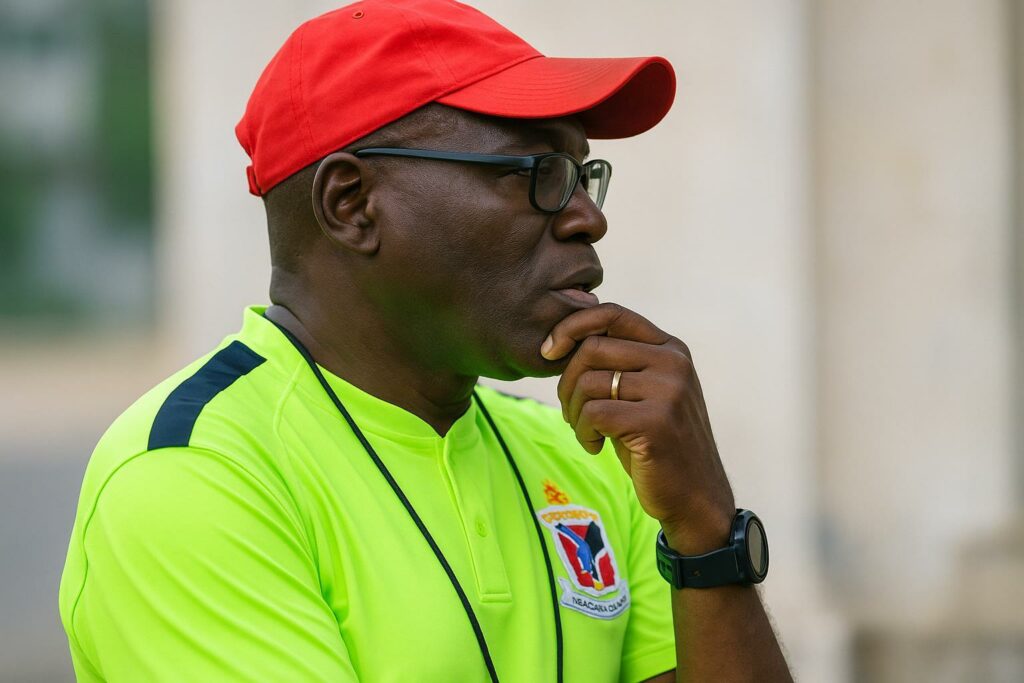A veteran tactician reflecting from Orléans
From the quiet banks of the Loire, sixty-five-year-old Jean-Paul Pila keeps a meticulous eye on Congolese scorelines that now reach him only through streaming services and WhatsApp alerts. The former trainer of the Diables Rouges cadets and of the women’s senior selection admits to a tinge of sadness each time a national side exits a qualifier prematurely. “Distance does not blunt passion,” he confides, his voice still carrying the clipped authority that once animated dressing rooms in Brazzaville, Malabo and Pointe-Noire. Settled in France since 2011, the man who guided Orléans’ under-18s before stepping back for personal reasons believes his country’s footballing shortcomings are less technical than logistical.
A curriculum forged across Central Africa
Pila’s curriculum vitae reads like a condensed history of Congolese club football. With Kotoko de Mfoa he conquered the Brazzaville first division title and sealed the 1989 national B championship, achievements that propelled him into the orbit of esteemed mentors Gaston Tchiangana, Roger Malonga and Gentil “Shopi” Nkounkou. A subsequent six-year spell at Étoile du Congo delivered three league crowns, two national cups and regular forays into continental competitions, reinforcing a reputation for methodical preparation rather than flamboyant touchline gesturing. Stints at CARA, Club 57, Saint-Michel d’Ouenzé, La Mancha and Patronage followed, each brief yet productive. When the Equatoguinean federation required fresh ideas in 2010, it was to Pila that officials turned, rewarding him with a silver medal at the Women’s Africa Cup of Nations.
Qualifications aligned with modern benchmarks
Pila is quick to dismiss the insinuation that African coaches lag behind in formal education. He brandishes, almost apologetically, a UEFA-aligned Licence A secured at Germany’s revered Sportschule Hennef in 1995. That badge crowns a pyramid of certificates accumulated under FIFA experts such as Joachim Fickert, Philippe Redon and Gabriel Calderón. “The classroom door has never frightened me,” he remarks, stressing that ongoing professional development is indispensable in an era of data analytics and periodisation. His trajectory, corroborated by archives of CAF training seminars and national technical directorates, positions him among the rare Congolese technicians whose paperwork satisfies the most demanding confederation statutes.
Funding constraints and the perennial debate
Yet credentials alone have rarely guaranteed success for Congolese coaches navigating domestic benches. According to Pila, the decisive variable remains the level of material backing afforded by clubs and federations. Travel allowances, training equipment and medical coverage constitute the tripod upon which performance stands, he argues, invoking his gold medal with the under-23s at the Central African Games as proof that results follow investment. Observers within the Fédération congolaise de football (Fécofoot) acknowledge that budgetary negotiations often stretch into the competitive season, constraining preparation. Pila’s plea, delivered without bitterness, is therefore straightforward: match the ambition of players and staff with commensurate means, or reconcile oneself with episodic brilliance instead of sustained progress.
À retenir
Jean-Paul Pila embodies a generation of Congolese coaches whose expertise, validated by European licences and African trophies, is under-utilised at home. His career trajectory from Kotoko to the Nzalang Nacional demonstrates that local knowledge can thrive internationally when supported by stable infrastructures.
Le point juridique/éco
Under CAF statutes amended in 2022, top-flight clubs must employ technicians holding at least a Licence A, aligning regulatory demand with Pila’s profile. Economically, the coach estimates that a seasonal budget of two million CFA francs dedicated exclusively to technical logistics would allow national sides to meet minimal FIFA preparation standards, a figure that remains marginal within the overall allocations of the Ministry of Sports yet could generate an outsized return in performance and sponsorship attractiveness.

